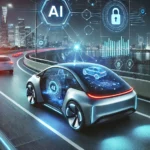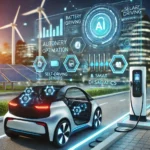The electric vehicle (EV) industry is undergoing a massive transformation, thanks to advancements in artificial intelligence (AI). From self-driving capabilities to battery optimization, AI-driven innovations in EVs are reshaping the future of transportation. In this article, we will explore the top 10 AI-powered EV brands that are leading the charge in AI integration. 1. Tesla – The Pioneer in AI-Driven EVs Tesla is widely recognized as the leader in AI and electric vehicles. The company’s Autopilot and Full Self-Driving (FSD) technology leverages machine learning in electric cars, allowing for autonomous driving capabilities. AI also plays a crucial role in Tesla’s battery management system (BMS), optimizing energy efficiency and enhancing vehicle performance. 2. NIO – AI-Powered Battery Swapping and Smart EVs NIO, a Chinese EV manufacturer, is at the forefront of AI-driven innovations in EVs. The company uses AI for battery swapping stations, ensuring faster and more efficient charging solutions. Their AI assistant, NOMI, enhances user experience by providing voice-activated controls and personalized driving assistance. 3. Rivian – AI-Optimized Off-Roading and Smart Navigation Rivian has integrated AI into its vehicles to improve off-road performance and energy efficiency. The brand’s machine learning in electric cars enables adaptive terrain response, optimizing power distribution based on real-time conditions. AI also assists in route planning and navigation, making road trips more efficient. 4. Lucid Motors – AI for Battery Optimization and Efficiency Lucid Motors stands out for its AI-driven battery management system. By using AI algorithms, Lucid vehicles maximize range and enhance energy efficiency. This AI for EV battery optimization ensures better performance and longevity of their high-capacity batteries. 5. BYD – AI for Autonomous Driving and Smart Connectivity BYD is leveraging AI in multiple ways, from autonomous driving to EV manufacturing with AI technology. The company’s AI-powered DiPilot system enhances self-driving capabilities, while AI-driven predictive maintenance ensures vehicle reliability. 6. BMW – AI-Enabled Smart Electric Vehicles BMW’s electric models, such as the iX, utilize AI in electric vehicles to offer adaptive driving modes, smart voice assistants, and enhanced driver assistance features. The company is also exploring AI-powered predictive maintenance to minimize breakdown risks. 7. Mercedes-Benz – AI-Driven Autonomous Driving Innovations Mercedes-Benz is heavily investing in AI for self-driving and advanced driver assistance systems (ADAS). Their MBUX Hyperscreen uses AI to provide an intelligent and intuitive infotainment experience, while AI-assisted battery management improves efficiency. 8. Ford – AI-Powered EV Development and Smart Charging Ford is integrating AI into its EV lineup, particularly in the Ford Mustang Mach-E and the upcoming all-electric Ford F-150 Lightning. AI is used for smart charging solutions, energy optimization, and improving vehicle safety through advanced driver-assistance systems (ADAS). 9. General Motors (GM) – AI for Self-Driving and Energy Efficiency General Motors, through its Cruise division, is advancing AI-powered self-driving technology. The company also utilizes AI to enhance battery performance and charging efficiency, ensuring longer EV range and durability. 10. Hyundai – AI for Autonomous Driving and Smart Mobility Hyundai’s IONIQ series incorporates AI to improve self-driving capabilities and smart electric vehicles with AI. The company’s AI-powered e-Pit fast-charging stations optimize the charging process, making EVs more convenient for daily use. How AI is Transforming Electric Vehicles The use of AI in EVs extends beyond self-driving features. AI-driven innovations in EVs include: Battery Management Systems (BMS): AI optimizes energy consumption and extends battery life. Autonomous Driving: AI-powered sensors and cameras enable safe and efficient self-driving experiences. Predictive Maintenance: AI detects potential mechanical issues before they become major problems. Smart Charging: AI helps optimize charging times, reducing electricity costs and enhancing grid efficiency. Final Thoughts The best EV companies using AI are setting new benchmarks in the automotive industry. As technology continues to evolve, we can expect even more AI-driven innovations in EVs that will improve safety, efficiency, and sustainability. With advancements in self-driving and AI in electric cars, the future of AI-powered EVs looks incredibly promising.
Category: AI
Introduction In today’s fast-paced digital world, staying connected is essential. Whether you’re traveling, working, or on the go, having a reliable power source for your devices is crucial. The Free Wire Boost Charger – Fast and Reliable Power Bank is the ultimate solution to keep your gadgets powered up efficiently. This high-speed portable charger is designed with ultra-fast charging technology, ensuring that your devices stay charged whenever you need them. Why Choose Free Wire Boost Charger? The Free Wire Boost Charger – Efficient and Safe Charging is more than just a power bank; it’s a quick charge portable power bank that offers exceptional performance, safety, and reliability. Here’s why it stands out: Ultra-Fast Charging: Equipped with the latest smart charging technology power bank features, it delivers fast power to your devices. High-Capacity Battery: With its high-capacity mobile charger technology, it provides multiple charges on a single cycle. Universal Compatibility: Works seamlessly with various smartphones, tablets, and other USB-powered devices. Portable & Lightweight: The best fast-charging power bank – Free Wire Boost Charger is designed for easy portability. Safety & Protection: Features built-in protection against overcharging, overheating, and short circuits. Features & Benefits 1. Ultra-Fast Charging Solution The Free Wire Boost Charger for smartphones and tablets offers quick charge portable power bank capabilities, ensuring that your devices get charged in the shortest time possible. 2. High-Capacity Mobile Charger With a robust battery capacity, this wireless charging alternative power bank can power up your devices multiple times before needing a recharge. 3. Reliable Backup Power Bank For travelers, students, and professionals, having a portable fast charger for travel – Free Wire Boost Charger is a game-changer. It provides a reliable power source wherever you are. 4. Smart Charging Technology Power Bank This universal fast charger for multiple devices ensures optimized power delivery to extend battery life and efficiency. 5. Durability & Safety The Free Wire Boost Charger – Efficient and Safe Charging includes protection against voltage fluctuations, ensuring safe and stable power output. How Fast Does the FreeWire Boost Charger Charge? One of the most common questions people ask is, “How fast does the FreeWire Boost Charger charge?” Thanks to its ultra-fast charging technology, it can power up a smartphone up to 50% in just 30 minutes, depending on device compatibility. This feature makes it one of the fastest power banks for smartphones available today. Is the Free Wire Boost Charger Good for Travel? Absolutely! The Free Wire Boost Charger – Fast and Reliable Power Bank is designed to be compact and lightweight, making it the best fast-charging power bank – Free Wire Boost Charger for travelers. Its portable fast charger for travel – Free Wire Boost Charger design ensures you have power anywhere, anytime. What Makes FreeWire Boost Charger Different from Others? When comparing power banks, it’s important to consider speed, durability, safety, and compatibility. The FreeWire Boost Charger reviews – Is it worth it? confirm that it excels in: Faster Charging: Outperforms standard power banks. Longer Battery Life: Higher retention capacity. Enhanced Safety Features: Protects devices from overheating and power surges. Compare FreeWire Boost Charger with Other Power Banks When choosing a power bank, buyers often search for, “Compare FreeWire Boost Charger with other power banks.” This charger surpasses others in terms of efficiency, speed, and reliability. Feature FreeWire Boost Charger Other Power Banks Charging Speed Ultra-fast charging Standard charging Portability Lightweight & compact Bulky & heavy Compatibility Universal support Limited devices Battery Life High-capacity Medium-capacity Safety Features Advanced protection Basic safety Where to Buy FreeWire Boost Charger Online? If you’re looking to buy Free Wire Boost Charger online – Best price, you can find it on: Amazon Official Website Major Electronics Retailers FAQs 1. What is the best fast portable charger? The Free Wire Boost Charger – Ultra-Fast Charging Solution is one of the most reliable and efficient power banks available, ensuring your devices are always charged. 2. How fast does the FreeWire Boost Charger charge? With smart charging technology power bank features, it can charge up to 50% in just 30 minutes. 3. Is the FreeWire Boost Charger good for travel? Yes, its portable fast charger for travel – FreeWire Boost Charger design makes it perfect for on-the-go charging. 4. Which power bank charges devices the fastest? The Free Wire Boost Charger – High-Speed Portable Charger is among the fastest, thanks to its quick charge portable power bank technology. 5. What makes FreeWire Boost Charger different from others? It stands out due to its universal fast charger for multiple devices, high-speed performance, and enhanced safety features. Conclusion The Free Wire Boost Charger – Fast, Reliable in USA is the ultimate power solution for those who need efficient and safe charging on the go. With its high-capacity mobile charger and smart charging technology power bank features, it’s a must-have for anyone who values convenience and reliability. If you’re looking for the fastest power bank for smartphones – Shop now, don’t miss out on the Free Wire Boost Charger! It’s time to stay powered up anytime, anywhere.
Introduction The electric vehicle (EV) industry is experiencing rapid growth, driven by the need for sustainable transportation solutions. However, challenges such as battery longevity, production costs, and charging efficiency still hinder widespread adoption. This is where Artificial Intelligence (AI) steps in. By leveraging AI-powered solutions, the EV sector is undergoing a transformation that enhances efficiency, reduces costs, and paves the way for autonomous driving. 1. AI-Powered Battery Management Role of AI in Battery Efficiency Battery performance remains one of the most critical factors in EV adoption. AI plays a pivotal role in optimizing battery management systems (BMS), ensuring longer lifespan and efficiency. AI-driven models analyze usage patterns and environmental conditions to extend battery life and improve charge cycles. Case Study: EVE-Ai™ by Electra Vehicles EVE-Ai™ by Electra Vehicles is a cutting-edge AI software designed to enhance battery intelligence. By predicting battery behavior, optimizing charge/discharge cycles, and preventing degradation, EVE-Ai™ helps EV manufacturers deliver more reliable and longer-lasting batteries. 2. Smart Manufacturing with AI AI in Production Optimization AI-driven automation is transforming the manufacturing sector by improving efficiency and reducing waste. Machine learning models analyze production line data, identifying inefficiencies and areas for improvement. AI-Driven Quality Control Using AI-powered visual inspection, manufacturers can detect defects in components at an early stage. This ensures higher-quality EVs while reducing material wastage and costs. 3. AI-Driven Vehicle Design How Monolith AI Enhances EV Engineering Monolith AI is a game-changer in vehicle design and engineering. It enables engineers to run AI-driven simulations, reducing the time required for prototyping and testing. This results in faster development cycles and cost savings. Improving Aerodynamics with AI AI analyzes aerodynamic data to optimize vehicle shapes, reducing drag and improving energy efficiency. This is crucial for enhancing range and performance. 4. Predictive Maintenance and AI Reducing Downtime with AI Predictive maintenance uses AI to detect potential failures before they occur. This helps prevent unexpected breakdowns and costly repairs. AI-Based Fault Detection AI algorithms analyze real-time vehicle data to identify abnormal patterns. This allows manufacturers and fleet managers to address issues proactively. 5. Autonomous Driving and AI AI-Powered ADAS Features Advanced Driver Assistance Systems (ADAS) use AI to enhance safety with features such as lane-keeping assistance, adaptive cruise control, and collision avoidance. The Future of Self-Driving EVs AI-driven self-driving technology is rapidly evolving. Companies like Tesla and Waymo are leading the charge toward full automation, leveraging deep learning and computer vision to navigate roads safely. 6. AI in EV Charging Optimization Smart Charging Algorithms AI-powered smart charging systems optimize when and how EVs charge, reducing strain on the grid and lowering electricity costs. AI in Grid Load Balancing AI analyzes grid data to balance demand, ensuring stable energy distribution for EV charging stations. 7. Sustainability and AI in EVs AI for Reducing Carbon Footprint AI helps EV manufacturers minimize waste and reduce emissions by optimizing production and supply chain processes. AI in Recycling and Resource Management AI-powered sorting systems improve battery recycling efficiency, ensuring valuable materials are reused rather than discarded. Frequently Asked Questions (FAQs) 1. How does AI improve battery performance in EVs? AI optimizes battery management by analyzing usage patterns, predicting degradation, and enhancing charge cycles. 2. Can AI help reduce EV manufacturing costs? Yes, AI-driven automation and predictive analytics reduce material waste, improve production efficiency, and lower costs. 3. What role does AI play in autonomous EVs? AI powers self-driving capabilities through machine learning, sensor fusion, and real-time decision-making algorithms. 4. How does AI optimize EV charging stations? AI ensures efficient energy distribution by balancing grid demand and scheduling charging during off-peak hours. 5. Are AI-powered EVs more sustainable? Yes, AI enhances sustainability by reducing waste, optimizing energy use, and improving battery recycling methods. 6. What is the future of AI in the EV industry? AI will continue to evolve, driving innovations in self-driving technology, smart charging, and energy efficiency. Conclusion AI is reshaping the EV industry by enhancing battery performance, improving manufacturing processes, and paving the way for autonomous driving. With cutting-edge solutions like EVE-Ai™, Monolith AI, and Teslavolts’ IC3, the future of electric vehicles looks smarter, more efficient, and increasingly sustainable. As AI technology continues to advance, we can expect even greater innovations that will revolutionize transportation as we know it.
Introduction The integration of Artificial Intelligence (AI) in the EV industry is transforming the way electric vehicles (EVs) are designed, manufactured, and operated. AI is revolutionizing smart EV technology by enhancing energy efficiency, optimizing battery performance, and enabling autonomous electric vehicles. With advancements in machine learning in the EV industry, AI-driven solutions are making EVs smarter, safer, and more sustainable. In this article, we explore how AI is shaping the future of electric mobility and its impact on different aspects of the EV ecosystem. How AI is Transforming the EV Industry The rapid adoption of AI-powered electric cars is driven by advancements in data analytics, cloud computing, and the Internet of Things (IoT). AI is applied in various areas, including predictive maintenance in electric vehicles using AI, self-driving capabilities, battery management, and AI-driven EV charging systems. Here’s how AI is reshaping the EV industry: 1. AI for EV Battery Optimization One of the critical challenges in the EV industry is battery performance and longevity. AI-based battery management in EVs helps optimize charging cycles, prevent overheating, and extend battery life. Neural networks in electric cars analyze battery data in real-time, enabling predictive analytics to improve energy efficiency and reduce degradation. 2. AI-Driven EV Charging Systems AI is playing a crucial role in building a smart AI-based EV charging solution. By integrating AI with EV charging infrastructure, smart charging stations can dynamically adjust power distribution based on energy demand and grid availability. Additionally, AI-driven Vehicle-to-Grid (V2G) technology allows EVs to supply electricity back to the grid, creating a sustainable and efficient energy ecosystem. 3. AI in Self-Driving Electric Cars Autonomous electric vehicles rely on AI-powered systems for navigation, object recognition, and decision-making. AI in self-driving electric cars uses deep learning algorithms and LiDAR technology to process sensor data, enabling real-time autonomous driving. Companies like Tesla, Waymo, and Rivian are investing heavily in AI-driven autonomy to enhance vehicle safety and performance. 4. Predictive Maintenance in Electric Vehicles Using AI AI-powered predictive maintenance in electric vehicles helps identify potential failures before they occur. By analyzing historical and real-time vehicle data, AI algorithms predict when components like brakes, batteries, and tires may need servicing. This reduces downtime, lowers maintenance costs, and enhances vehicle reliability. 5. AI for Range Prediction in Electric Cars AI for range prediction in electric cars is improving driving efficiency by accurately estimating battery range based on driving behavior, road conditions, and weather. Machine learning models analyze these factors in real time, helping drivers make informed decisions to optimize their journey and reduce range anxiety. 6. AI in Fleet Management for EVs Fleet operators are leveraging AI in fleet management for EVs to optimize route planning, energy consumption, and vehicle usage. AI-powered analytics provide insights into fleet performance, enabling businesses to reduce operational costs and improve sustainability. 7. AI in Connected Cars and Smart Mobility The rise of AI in connected cars and smart mobility is enabling seamless communication between vehicles, infrastructure, and cloud-based platforms. AI enhances intelligent transportation systems, allowing for real-time traffic analysis, accident prevention, and automated decision-making. 8. AI-Driven Energy Efficiency in EVs AI enhances AI-driven energy efficiency in EVs by optimizing powertrain performance, reducing energy wastage, and integrating renewable energy sources. AI-based systems monitor energy consumption patterns to suggest efficiency improvements, contributing to the sustainability of electric mobility. 9. AI Applications in Next-Generation EVs The future of AI in electric mobility includes innovations such as AI-powered voice assistants, adaptive cruise control, and real-time driver monitoring. AI is also being integrated into smart grid for electric mobility, enabling efficient energy distribution and reducing the environmental impact of EVs. FAQs 1. How is AI transforming the EV industry? AI is revolutionizing the EV industry by optimizing battery performance, enabling autonomous driving, enhancing predictive maintenance, and improving energy efficiency. It is also used in smart charging infrastructure and fleet management. 2. What role does AI play in self-driving electric cars? AI enables self-driving electric cars by processing real-time sensor data, recognizing objects, making driving decisions, and navigating complex environments. It ensures safety and efficiency in autonomous driving systems. 3. How does AI improve battery management in EVs? AI-based battery management systems optimize charging cycles, predict battery failures, and prevent overheating. Machine learning in the EV industry helps improve battery longevity and energy efficiency. 4. Can AI help with EV range prediction? Yes, AI for range prediction in electric cars analyzes driving patterns, weather conditions, and terrain to provide accurate battery range estimations, helping drivers plan their trips effectively. 5. What is the future of AI in electric mobility? The future of AI in electric mobility includes advancements in autonomous driving, smart grids, AI-driven energy management, and real-time traffic analytics. AI will continue to enhance safety, efficiency, and sustainability in the EV industry. Conclusion The integration of Artificial Intelligence in EVs is transforming the electric vehicle industry, making it smarter, more efficient, and more sustainable. AI-driven innovations in EV energy management, predictive maintenance, autonomous driving, and smart charging infrastructure are shaping the future of electric mobility. As AI continues to evolve, it will play a crucial role in accelerating the adoption of AI-powered electric cars and creating a cleaner, greener transportation ecosystem.




